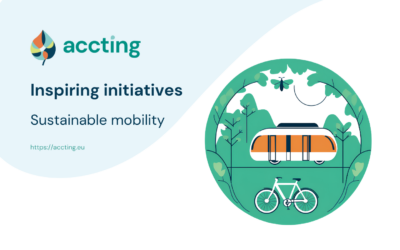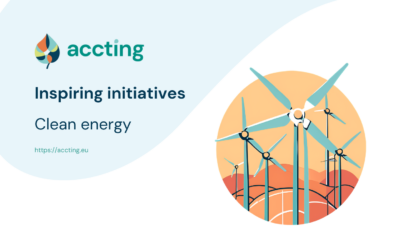This article is part of a three-part series focusing on the successes, challenges and lessons learnt from ACCTING’s pilot projects.
Three years ago, the ACCTING project set out to explore how to make the European Green Deal more inclusive and just, especially for communities often left behind. Alongside research activities, ten pilot projects across Europe were funded. The context in which pilots were implemented however vary greatly – this includes the sectoral (from fire resilience to cycling) and geographic context (from rural Zagori to urban Palermo), as well as the primary target group (from Roma communities to disadvantaged youth). Nevertheless, there is a range of shared successes and achievements, challenges and obstacles as well as general lessons learnt that can be identified as cross-cutting.
Lessons learnt by the ACCTING pilots
- Many pilots stressed the need for increasing investment in approaches grounded in resilience and dialogue, given environmental variables and increasingly volatile climatic conditions. While some successes were seen in this regard, the lack of response and top-down approach taken by many public authorities towards the pilots is at odds with the need to engage and co-create with the public. As conditions on the ground become increasingly unstable and prone to sudden changes, traditional planning approaches become less fit for purpose and an approach of regular monitoring and dialogue is instead needed.
- We also see that there are different ways municipalities can support the work of CSO actors. These might be simply uptake and scaling (as in the case of Dialogue & Action Against Wildfires’ fire resilience planning), but they could also take the form of enabling or complementary actions (as in the case of the Municipality of Kamëz building new bike lanes to support the cycling advocacy work of EduMove; or various Czech municipalities engaging with Mapko on ways to include community gardens in urban planning processes).
- The involvement of educational actors was commonly cited as a promising approach. This could be in terms of stakeholder recruitment generally (for instance, EduMove noted that working with students had the benefit of involving a lot of young, open-minded potential participants). Or as seen in Success #3, it could be involvement of respected academic institutions to provide legitimacy to the project (see Echoversity). The strong potential “ripple effects” of working through educational policy was noted in a number of instances, a way to reach less engaged individuals such as parents through their children (School goes green), or to test systems change in a smaller, more controlled environment (schools), before seeking to roll out similar changes at a city-wide scale (Food4Schools ).
- Educational policy is seen as a particularly crucial enabler of “locking in” learnings from pilot projects, – influencing generations of students through inclusion of project outputs in school curricula and thereby driving long-term behavioural change (EduMove). The incorporation of sustainability goals into educational curricula can also help to develop a more nuanced and systemic understanding of the issues at hand, with Food4Schools for instance citing the need for a Whole School Food Approach that recognises food education and food policies as inherently interlinked.
- Certain topics are particularly worth addressing through CSOs because they tend to have a bottom-up ethos yet have translocal relevance and are perhaps less limited by country-specific rules and regulations. Food gardens are one such community practice that is found across Europe and globally.
- In many instances, we see trade-offs between formalisation and flexibility / informality with the work of CSOs. There is a risk that positive avenues of dialogue and co-creation will cease, once projects are taken up and formalised by public actors. Resistance can also be raised by local communities to such formalisation attempts – for instance Supporting Roma micro-entrepreneurs in Albania noted the project’s aim to support vulnerable micro-entrepreneurs was met with resistance to change due to perceived risks of formalisation. Informal groups can be a valuable conduit for volunteering and activism, but these actors tend to still require support due to limited recognition and capacity, pointing to the potential value of umbrella / framework organisations like Supporting Roma micro-entrepreneurs in Albania and Uključi se! (Get involved!).
- This links to an important point about the complementarity of different actors. It is clear that there is real value in having different kinds of CSOs with complementary skill sets. Some might be more locally rooted, trusted by their communities, and activism-oriented. Others might be more institutionally rooted, experienced and well-organised and -capacitated, able to provide a link between public actors and/or business and community groups on the ground. PA9 for instance notes that they “provide mentors through local partners that are “hands-on” support for each informal group. They can support them in project writing, financial, communication and reporting aspects of the project.” Finding a balance between these types of CSOs is key.
- Even at the bottom-up level, there is evidence of an urban-rural divide, with initiatives in rural areas having a harder time obtaining the required institutional support. For instance, in Mapko it was noted that community gardens in urban areas like Prague benefit from greater institutional support, while rural regions struggle with limited access to resources such as funding and training for community garden leaders.
- Pilots can help make higher-level policy processes more tangible – creating localised findings and deliverables. Pilots can also likely benefit from greater institutional support if they make these links, i.e. helping policy-makers to solve a policy-problem that they already have. Food4Schools’s example of hoping to replicate their school food policy in Greece by noting how food systems transformation is entangled with climate resilience, and seeking to link to the work of Greek Mission Cities – Thessaloniki, Ioannina, and Kalamata.
- However, in relation to behavioural change particularly there are real shortcomings to a piloting approach. The experience of the ACCTING pilots shows that behaviour is often enabled or restricted by broader systemic conditions – especially for vulnerable groups. You cannot pilot your way out of structural challenges, and behavioural change is thus inherently linked to systemic change through structural policy. Dialogue & Action Against Wildfires went to great lengths to increase inclusion in their participatory work (e.g. improving gender balance) but noted that while targeted activities can help bring underrepresented voices to the table, more comprehensive mentorship programs or policy interventions may be required.
- In Dialogue & Action Against Wildfires, deeper structural issues (cultural norms, time constraints for caregiving, and limited familiarity with civil protection roles) also continued to hinder many women from taking on formal leadership positions in particular. For school food systems, Food4Schools similarly notes that behavioural change needs to be examined and pursued in the context of broader systemic change that cannot exclude public institutions, authorities and the market. Similarly, their Local Action Plan notes that transition towards more sustainable school food systems in nurseries cannot be ventured as a pilot. Instead, change needs to be incremental and applied gradually across all nurseries.
- In this regard a holistic, multi-dimensional approach is usually needed to enable sustainable behavioural change. This needs to consist of various factors including a) awareness- / motivation-raising activities, b) support for skills / capacity, c) advocacy to change structural conditions, and d) influencing social dynamics in communities. EduMove uses the example of lack of safety as a central barrier for a modal shift to cycling. They argue that this multi-dimensional phenomenon can only effectively be tackled as such through actual infrastructural change to increase road safety, awareness campaigns for drivers and other transport users, and training and equipment for would-be cyclists to improve skills and subjective feelings of safety.
- To support ongoing sustainability of pilot work, there is potential in using graduates and/or former participants as multipliers for ongoing CSO work. This can keep the project running in its original location and help to ensure buy-in of local (vulnerable) communities – creating role model figures. A clear example is seen in School goes green, where a past graduate of the school volunteering programme is employed in the project co-ordination team, allowing future volunteers to more easily see themselves in the project.
- Finally, it is worth highlighting that the success of projects does not depend only on the quality of the project put forward, but also that it is simply the right project at the right time (see Success #7). InclusivECs awards’ challenges with many energy communities (ECs) not registering for the inclusive award ceremony, arose because many existing ECs did not know how to design inclusive actions.
The topic of inclusive energy communities was simply too new in Spain, requiring a partial shift in approach to providing more practical guidance. It might have been more useful to have a project that from the start builds capacity for inclusive actions, instead of one that sought to celebrate such actions prematurely.
Conclusion
The ACCTING pilot projects were successful in promoting inclusive, collective action towards sustainability foremost through their direct engagement with the target community. Through their efforts in promoting inclusive co-creation and community ownership, they successfully empowered vulnerable groups to play an active role in transition processes. Collective behavioural change was furthermore promoted through engaging and fun methodologies, breaking down EGD priorities to the lived realities of target groups and ensuring that communities derive tangible benefits. Pilots were able to build sustainable impact by building platforms for ongoing collaboration, bringing diverse stakeholders together as intermediaries, promoting the public institutionalisation of the piloted approaches, and facilitating translocal learning and multiplication.
These successes provide evidence regarding the value and effectiveness of the approach, trusting CSOs and community-led initiatives to drive place-based transformations in line with EGD policy goals. On the other hand, the successes serve as valuable source of insights and inspiration for similar projects, and of policy recommendations to strengthen such work.
At the same time, the pilot projects encountered a range of challenges and barriers that served as a bottleneck for sustainable impact. Two major clusters emerged: On the one hand, CSOs struggle with the lack of secure and sustainable funding mechanisms. Financial constraints, “projectism” and competition for funds also leads to other operational challenges, like capacity constraints, the lack of personnel continuity and exclusionary practices. On the other hand, the PAs struggled with collaborating with political and administrative authorities, leading for instance to difficulties in obtaining government permission for project activities. Reasons are top-down administrative cultures and intransparencies, but also limited capacities of (local) governance to pursue in-depth partnerships.
Pilots highlight that a shift in perspective is necessary, so as to prioritise investment in (community) resilience and social infrastructure in times of increasing uncertainty. Civil Society Organisations can play a key role in providing this, especially in partnership with local governments and supported through sustainable funding arrangements. The learnings also point to the importance of education in promoting behavioural change, targeting educational actors and policy makers as key actors. At the same time, behavioural change is often enabled or restricted by broader systemic conditions, especially for vulnerable groups. This includes infrastructure, cultural norms and the individual socio-economic situation, limiting the capacity to engage. Holistic, multi-dimensional approaches are needed that consider individual capabilities, structural conditions and social dynamics.
This article is part of a three-part series focusing on the successes, challenges and lessons learnt from ACCTING’s pilot projects.


